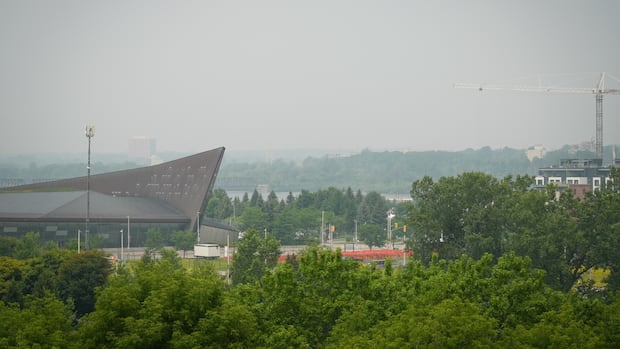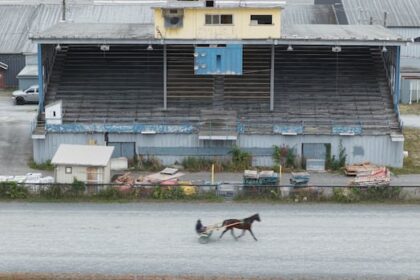Ottawa·NewThe heat warning issued last Friday for the Ottawa-Gatineau region should last until Thursday night, according to Environment Canada. Special air quality statements issued by the agency on Monday also linger Tuesday.7-day heat wave could peak at 33 C in OttawaCBC News · Posted: Jul 15, 2025 10:18 AM EDT | Last Updated: 9 minutes agoThe Canadian War Museum is seen through wildfire smoke in Ottawa on July 14, 2025. Communities along the St. Lawrence River and Lake Ontario experienced the worst air quality Tuesday morning. (Mathieu Deroy/CBC)The heat warning issued last Friday for the Ottawa-Gatineau region should end Thursday night, according to Environment Canada.Special air quality statements issued by the agency for many areas on Monday also linger Tuesday.The heat warning now covers nearly all of eastern Ontario, with the exception of western communities such as Deep River and Bancroft.There’s also a heat warning for the southern Outaouais, including Fort-Coulonge, Gatineau, Grenville-sur-la-Rouge and Kazabazua.Wednesday could be the hottest day for Ottawa of the heat wave by a small margin, with a projected daytime high of 33 C feeling as hot as 41 with humidity. Ottawa topped 32 C on Saturday, with its humidex getting into the low 40s on Saturday and Sunday.Western Quebec’s heat warning is just a titch cooler and forecast to end overnight Wednesday into Thursday.More seasonal highs in the upper 20s are forecast for the rest of the week.The air quality statement in Ontario has shrunk somewhat and now covers Ottawa, communities to its east and an area along the St. Lawrence River and Lake Ontario.Another covers all of western Quebec.The Air Quality Health Index as of 9 a.m. on Tuesday was moderate in Belleville, Cornwall, Kingston and Ottawa. The forecast maximum in Gatineau for the day is also moderate.The ongoing wildfires in northern Ontario have forced several First Nations to evacuate, though some of the most vulnerable remain, in need of medical evacuation. On Monday, six communities were experiencing power outages.Staying safeAmid poor air quality and extreme heat, Health Canada and Environment Canada recommend staying indoors, if possible, when the weather is at its worst. Certain people may be more vulnerable to these weather events, like the very young or very old, pregnant people, and those with underlying health issues.If you are outside in the heat, Health Canada recommends staying cool and staying hydrated. Watch for signs of heat exhaustion — like a headache, dizziness or a rapid heartbeat — and get to a cool place where you can drink water. Heat stroke, which includes confusion and very hot or red skin, is a medical emergency requiring a 911 call.WATCH | Advice for extreme heat:Here’s how to stay safe and cool as temperatures heat up in OttawaCBC’s Nkele Martin spoke with experts about dangerous symptoms to look out for and what types of activities are safe when the mercury starts to rise. More resources may be available through your municipality. Ottawa, for example, has a map of public and other places to cool off and Russell to its east is opening cooling centres sTuesday through Thursday.Poor air quality can cause mild symptoms including eye, nose and throat irritation, headaches or a mild cough, Environment Canada’s statement said, or more severe symptoms like chest pains, wheezing or a severe cough.It also noted that, in addition to other vulnerable populations, anyone who works outside during the day is more susceptible to poor air quality.A moderate air quality risks means at-risk people should consider scaling back or rescheduling strenuous outdoor activities. The general population should be fine, but should watch for symptoms.
Thursday, 5 Feb 2026
Canada – The Illusion
Search
Have an existing account?
Sign In
© 2022 Foxiz News Network. Ruby Design Company. All Rights Reserved.
You May also Like
- More News:
- history
- Standing Bear Network
- John Gonzalez
- ᐊᔭᐦᑊ ayahp — It happened
- Creation
- Beneath the Water
- Olympic gold medal
- Jim Thorpe
- type O blood
- the bringer of life
- Raven
- Wás’agi
- NoiseCat
- 'Sugarcane'
- The rivers still sing
- ᑲᓂᐸᐏᐟ ᒪᐢᑿ
- ᐅᑳᐤ okâw — We remember
- ᐊᓂᓈᐯᐃᐧᐣ aninâpêwin — Truth
- This is what it means to be human.
- Nokoma











